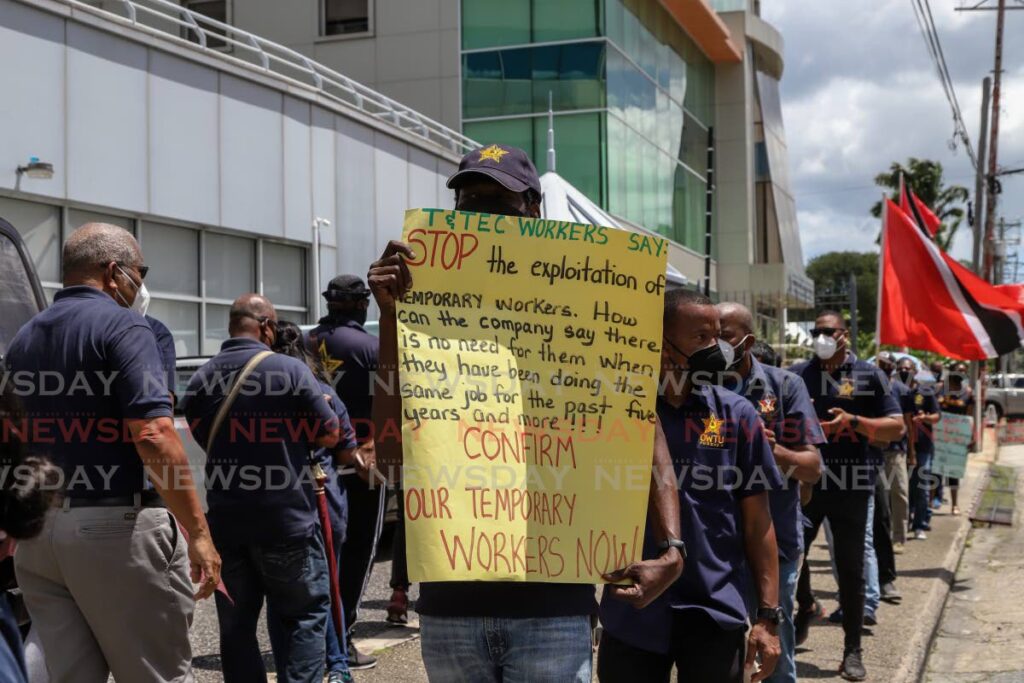A worker by any other name is still a worker

Given the uncertain economic situation of Trinidad and Tobago, there are a number of issues relating to industrial relations that are bring disputed and which both employers and unions appearing on behalf of aggrieved workers should be aware of, in order to “take in front before in front takes you.”
Following the sporadic periods of lockdown ordered by Cabinet over the past two years which resulted in no income for small and medium-sized entrepreneurial enterprises and massive lay-offs, and in too many cases closure of small businesses, the recent relaxation of restrictions has led to an effort by some of the more hopeful people to try again.
This has been made difficult for startups, or re-startups, by the recent policies adopted by banks throughout the Caribbean to pursue what is called “de-risking.”
Part of the reason for this, no doubt, is due to the sad international reputation TT has gained as a money-laundering centre; the other is, one suspects, directly due to government’s policies of forced closures of commercial enterprises that resulted in respondents’ defaulting on loans and mortgages.
Even where the loans by banks were in theory backed by property assets, some assets lost value, and as a result, small and medium-sized enterprises (SMEs), which employ most people, workers and managers without distinction, defaulted. And banks, afraid of losing profits, no longer accept the risk startup, or re-startup business loans represent.

By now, most people are aware of supply-chain economics and consequential development of policies by governments of lockdowns leading to market failures, which in turn led to layoffs in employment, which led to defaults on loans (both individual and commercial), which resulted in the closure of small enterprises.
As the first attempts at re-starting began this year, many SMEs, trying to minimise risk themselves, took to recruiting part-time contract labour, rather than permanent local employees. I am told by a reliable source that the Ministry of Works depended for years on this form of employment to fulfil its project requirements. And as everyone and their cousin is aware, roadworks and URP systems have always operated on that basis.
It is only in the private sector, however, that the distinction between status of “contract of service,” ie permanent employees, versus those employed under “contract for services,” ie contract employment, gets to the Industrial Court for determination.
The disputes usually arise when such an employee’s contract is terminated. People are desperate for work, having been unemployed for months; children are back to school, having outgrown uniforms and shoes; and medical procedures put off for two years are now getting critical. Medical fees, like the cost of food, have escalated.
The distinction between permanent and contract employment makes a huge difference in long-term survival, but many people take whatever is on offer without knowing the difference, and only when they are terminated do they fight for retention.
Remember, “employee” refers to anyone hired by someone else for payment or reward, be he cleaner, CEO or commercial supervisor.
In a recent case, there was an interesting court award that attempted to make the distinction clear between whether a worker who was charged with theft and forgery (charges which the union did not contest), was an “independent contractor,” as his letter of employment stated, or a “worker under a contract of services,” which the company denied.
The theft issue, which took place in 2011, was not the issue before the court. But since neither the union nor the company had raised the classification as an issue when the grievance was registered, and it was not raised in the closing remarks, under the rules of the court it could not be raised on appeal subsequently.
However, in the written judgment issued on March 3, the court, quite correctly, took “judicial notice” of “substance over form”: that the worker’s payslips had deductions for national insurance dues, health surcharge, mobile phone, “rental of route” – whatever that is – and other charges (which independent contractors are usually responsible for on their own).
He drove a company vehicle, was assigned a company helper to assist him, and was granted vacation leave. So on the unstated but locally implied principle, one may safely assume applied: (if it looks like a duck…) the court said, “Therefore, we are of the opinion that the employee was in fact an employee ‘of service’ as opposed to being employed ‘for services’ and was, in fact, a worker given the facts presented.”
Let us therefore be guided. Not everyone with the name Prince belongs to the royal family, or, as the bard said, “A rose by any other name…” And not everyone hired as an independent contractor will be accepted by the court as independent in truth.
One matter still worries practitioners, and that is why our judicial system allows for many delays and side issues to be raised.
If the old adage allows that: “Justice delayed is justice denied,” why did it take nine years, until March this year, for a case that arose over a theft and forgery matter which was not contested, for the classification of the worker to be resolved, instead of having it decided directly by the court under Section 16 (1)?
This was through no fault of the overburdened court, but through the potential for the delay being built into the Industrial Relations Act itself.
The act was passed in 1972. The economy and the environment have changed over the 50 years since. Is it not time for the IRA to be brought up to date?

Comments
"A worker by any other name is still a worker"